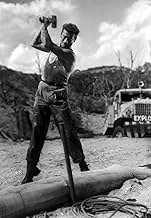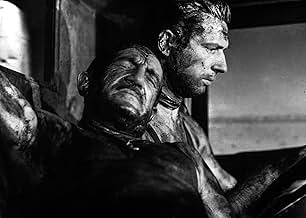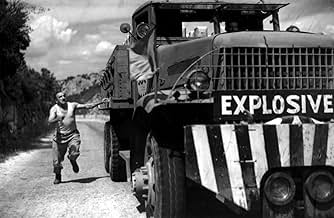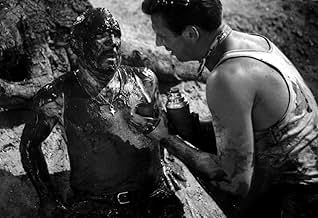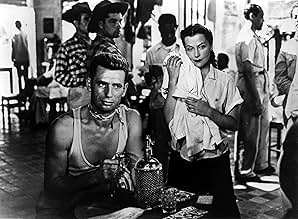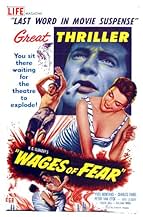In einem heruntergekommenen südamerikanischen Dorf werden ein paar Männer für einen dringenden Nitroglyzerintransport angeheuert, ohne dass dafür die notwendige Sicherheitsausrüstung vorhand... Alles lesenIn einem heruntergekommenen südamerikanischen Dorf werden ein paar Männer für einen dringenden Nitroglyzerintransport angeheuert, ohne dass dafür die notwendige Sicherheitsausrüstung vorhanden wäre.In einem heruntergekommenen südamerikanischen Dorf werden ein paar Männer für einen dringenden Nitroglyzerintransport angeheuert, ohne dass dafür die notwendige Sicherheitsausrüstung vorhanden wäre.
- Regie
- Drehbuch
- Hauptbesetzung
- 1 BAFTA Award gewonnen
- 6 Gewinne & 1 Nominierung insgesamt
Peter van Eyck
- Bimba
- (as Peter Van Eyck)
Véra Clouzot
- Linda
- (as Vera Clouzot)
Darío Moreno
- Pepito Hernandez
- (as Dario Moreno)
Antonio Centa
- Camp Chief
- (as Centa)
Charles Fawcett
- Bradley
- (Nicht genannt)
Zusammenfassung
Reviewers say 'The Wages of Fear' is a gripping film about desperation and survival, with intense suspense and masterful direction by Henri-Georges Clouzot. Critics praise Yves Montand and Charles Vanel's performances and the exploration of human resilience. Some find the initial setup slow and criticize the portrayal of the American oil company. Despite this, the film is celebrated for its innovative cinematography and thematic depth.
Empfohlene Bewertungen
"The Wages of Fear" was awarded by unanimous verdict the Grand Prix at 1953 Cannes Film Festival where it won over 27 films, some of which were made by Jacques Tati, Alfred Hitchcock, and Luis Buñuel. Cluozot's own screenplay (based a novel by George Arnaud) focuses on four down-and-out European adventurers (Yves Montand, Folco Lulli, Peter Van Eyck, Charles Vanel) who stuck nearly penniless in a festering town in an unnamed South American country. An oil company need a load of highly dangerous and explosive nitroglycerin to be delivered to a remote well fire 300 miles away burning out of control. The route is through jungles and over crude and treacherous mountains and those men are desperate enough to take the chance. None of these men is heroic or generous, they are in for the money. The four were chosen by the managers of oil company because "if something happens to them, no one would care, they have nobody to worry about them". Henri-Georges Clouzot's view on humanity is not particularly optimistic but he finds a way to make a viewer care about disenchanted but desperate characters. Thanks to Clouzot's ability to create not only a gripping action film but a powerful study of failure, the four men will stay for long time in our memory.
You're living in a barren, beaten land, in South America where the lost and lonely band, no way to pay for your escape, the barrels bottom is all you scrape, this ain't the dream that had been promised, or been planned. Then your offered a way out, a chance to flee, there's a price to pay but soon you could be free, if you drive a laden lorry, you can wrap yourself in glory, $2000 you'll receive as the payee.
If only driving a wagon a few hundred miles was all there was to it. A fantastic piece of film making that demonstrates how far people can sink and what boundaries they're prepared to cross to extricate themselves from those depths.
If only driving a wagon a few hundred miles was all there was to it. A fantastic piece of film making that demonstrates how far people can sink and what boundaries they're prepared to cross to extricate themselves from those depths.
10barleeku
This movie is astonishing, a gritty story filmed in an ultra-real style that relies simply on the beauty of lighting and film to achieve its stunning effects. It seems from another world, which in a way, it is. The acting is superb: Montand's Mario is full of jerky movements and intense impulses but always maintains his Gallic savoir-faire, while Charles Vanel as Jo brings, at first at least, a type of macho to the screen that modern movie-makers simply do not comprehend. The rest of the cast, especially the camp chief, Luigi, and Peter van Eyck as Bimba are incredible, as is Vera Clouzot who is incomprehensibly but believably upbeat and innocent - and totally gorgeous - in the midst of the hellhole of a town they're all stuck in. Clouzot's directing is flawless - I don't think anyone has ever squeezed more tension with just a few essential scene elements. The trucks wheeze and grunt as well as they ever have in the movies - the only comparison is Spielberg's early gem, "The Duel", but Clouzot's automotive cinematics outdo even Spielberg. The stripped down existentialism of the characters, the starkness of their shared dilemma, the grim and grimy scenery, and the cinematography itself are all of a piece. The latter is what elevates this movie to the very top rank, including some of the most dramatic and effective black and white shooting I've ever seen. Yet it never becomes mannered or gratuitous - it is orchestrated with the rise - and rise! - of tension in the film. The final scene takes on a surreal as opposed to ultra-realistic quality that has its own logic. One last word about the acting - we don't see anything like it anymore. The self-conscious mannerism of method acting (which has had its own triumphs) and the toxic awareness of everyone from the actors to the audience, the camera, directors, etc. that each actor is a celebrity and potential artiste, has ruined that conviction that actors were once larger than life people before they went on-screen, that they came to acting as an outcome of living rough, unadorned, and yet imaginative lives as opposed to shooting for fame and fortune and celebrity within an artificial corporate star-making incubator.
This movie is a true masterpiece in every way! When I rented the DVD and read the story it sounded familiar, because I had watched the newer version before in color with Roy Scheider, which was good as well. But watching the original film truly blew me away. This movie is well made in every detail. It puts a lot of detail-work in the creation of the characters, and once you think that is over and the "regular action-part" starts, it becomes even better and the story takes a 90 degree turn! After I had finished watching the entire movie, I needed at least 5 minutes just to "digest" it and rethink this fantastic film. If you got a chance to watch it, don't miss it! It is entertaining from the first to the last minute!
Whoever it may be to rightly claim that he invented the action thriller genre (Méliès, I suppose), Henri-Georges Clouzot's "Le salaire de la peur" is an indispensable milestone on the exciting route to the best films of that kind in the 70's, 80's and nowadays. In its tenseness, as symbolized by the danger of explosion of the lorries' loads, it has hardly been surpassed.
The plot is perfectly worked out from start to end, the leading players act in some of their best parts ever, the (almost) absence of music supports the brutal realism and the consequent choice of authentic outdoor settings contributed a lot to the film's deserved success. Historically, it ranges between neorealismo and nouvelle vague, and yet it is its pure action and suspense that make it worth watching for younger audiences who wouldn't go in for just the artistic way. - Only flaw I can see is the curious, rather artificial change in Vanel's character which has no comprehensible motivation, at least for me whenever I see it.
Apart from that, Clouzot's wife Véra (also well-known from his "Les diaboliques") plays to the "most breathtaking angles" gallery when she bows down to scrub the floor of Dario Moreno's gin joint. It's a man's world after all and there are male perspectives on human survival only. Well, it's existentialism, mates. Altogether, the black and white photography is gripping. The gun scene between Lulli and Vanel is one of the best montages in film history, and there is more excellent editing in "Salaire" (including the finale) that completely fits the hot atmosphere.
The plot is perfectly worked out from start to end, the leading players act in some of their best parts ever, the (almost) absence of music supports the brutal realism and the consequent choice of authentic outdoor settings contributed a lot to the film's deserved success. Historically, it ranges between neorealismo and nouvelle vague, and yet it is its pure action and suspense that make it worth watching for younger audiences who wouldn't go in for just the artistic way. - Only flaw I can see is the curious, rather artificial change in Vanel's character which has no comprehensible motivation, at least for me whenever I see it.
Apart from that, Clouzot's wife Véra (also well-known from his "Les diaboliques") plays to the "most breathtaking angles" gallery when she bows down to scrub the floor of Dario Moreno's gin joint. It's a man's world after all and there are male perspectives on human survival only. Well, it's existentialism, mates. Altogether, the black and white photography is gripping. The gun scene between Lulli and Vanel is one of the best montages in film history, and there is more excellent editing in "Salaire" (including the finale) that completely fits the hot atmosphere.
Wusstest du schon
- WissenswertesYves Montand and Charles Vanel both suffered from conjunctivitis after filming in a pool of crude oil and being exposed to gas fumes.
- PatzerWhen Bimba is shaving in the cab of the truck, he has the right side of his face covered in shaving cream, but when he turns to talk to Luigi the right side of his face is clear of shaving cream.
- Alternative VersionenThe film was cut for U.S. distribution in 1954, in part due to scenes that denounced crooked U.S. business interests in Latin America. The Criterion Collection laserdisc restored the film to its uncut version with 21 minutes of footage removed from other versions of the film.
- VerbindungenFeatured in Montand à la rencontre de Pagnol (1986)
- SoundtracksThe Blue Danube
Composed by Johann Strauss
Top-Auswahl
Melde dich zum Bewerten an und greife auf die Watchlist für personalisierte Empfehlungen zu.
Details
- Erscheinungsdatum
- Herkunftsländer
- Sprachen
- Auch bekannt als
- El salario del miedo
- Drehorte
- Produktionsfirmen
- Weitere beteiligte Unternehmen bei IMDbPro anzeigen
Box Office
- Bruttoertrag in den USA und Kanada
- 21.228 $
- Eröffnungswochenende in den USA und in Kanada
- 7.633 $
- 1. Dez. 2024
- Weltweiter Bruttoertrag
- 22.326 $
- Laufzeit
- 2 Std. 30 Min.(150 min)
- Farbe
- Seitenverhältnis
- 1.37 : 1
Zu dieser Seite beitragen
Bearbeitung vorschlagen oder fehlenden Inhalt hinzufügen

![Trailer [English SUB] ansehen](https://m.media-amazon.com/images/M/MV5BNWU5Zjk4MDAtZDM1Ni00YzJmLTkyZTUtYjVhN2VjNzZmOGVhXkEyXkFqcGdeQXRyYW5zY29kZS13b3JrZmxvdw@@._V1_QL75_UX500_CR0)
